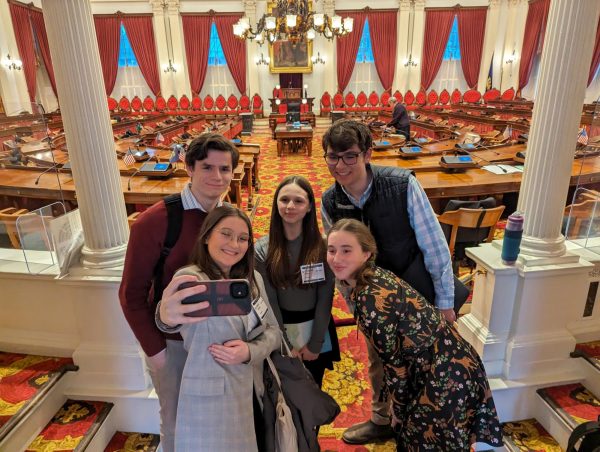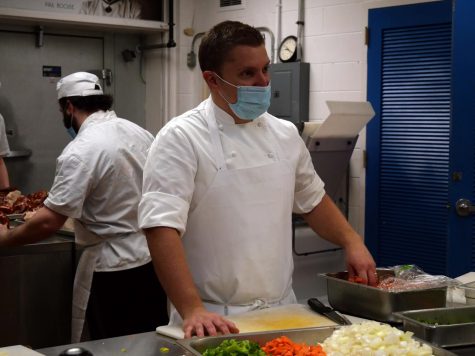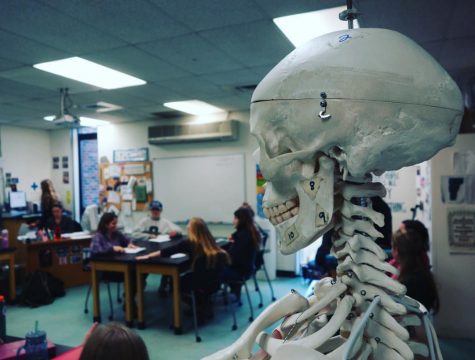All for one or one for all

November 5, 2017
Volunteering is always something that is on people’s minds during high school. This is especially true for seniors.
With the school year zooming by, seniors must find a way to incorporate at least ten hours of volunteer work into the next nine months in order to graduate and move on in their lives.
Yet many seniors are struggling to put in their ten hours due to certain circumstances such as a job or homework overload.
According to Geoff Murray, the volunteer coordinator and a social studies teacher, “Volunteering captures the spirit of civic virtue and participating (as an) active citizen in your community, number one, and number two, volunteering at BFA is a way of saying to the community members that have supported BFA throughout the 12 years of schooling via the budgets; kinda a way of saying thank you for that as well and we’re going to give a little bit back to the community.”
Civic Virtue, as defined by learningtogive.org, is morality or a standard of righteous behavior in relationship to a citizen’s involvement in society.
But not everyone can participate in civic virtue through volunteering because of their jobs or family duty, so a possible policy change has been suggested through recent years.
“The current policy has worked since 1990, so if there needs to be a change I think there would have to be a specific reason as to why we would change it and not just to change it just for change. I’m not saying I’m against it or for it, I’m just saying there would have to be some valid reasons to change a policy that, by and large has worked for almost 30 years and every year our senior class gives back between 2-3,000, sometimes over 3,000 hours of community service in a 9 month period, or 12 month period,” Murray said, “It’s just, currently, the policy shoots for your senior year, so until the policy is changed, we just have to follow that. But that certainly has been a topic of conversation.”
Of course, if the policy was to change to incorporate other grades to do their required ten hours of community service, there are some foreseeable challenges that would likely occur.
“There may be a clerical issue as far as collecting the paperwork and holding on to it for four years. That would just have to be worked out to make sure that we would have the appropriate files here at BFA. Secondly, a problem could be ensuring that the paperwork is turned in in a timely manner… Time tables on getting your paperwork in could be a problem. Now, for seniors, it’s condensed into a 9 month period. You’d be opening it up to more like, 30+ months. That type of paperwork trail would have to be worked out as well,” Murray said.
Volunteering also offers many health benefits. According to Nationalservice.gov, those who volunteer have lower mortality rates, greater functional ability, and lower rates of depression later in life than those who do not volunteer.
So perhaps the policy should change to allow students of younger grades to participate in volunteering, gaining experience for resumes, and getting all of the proper health benefits that volunteering could offer.
Volunteering has been on a steady decline in recent years, according to a blog on Volunteermatch.org.
“I am a volunteer coordinator at a large nonprofit but have to wear many different hats myself. In order to keep up with the volunteer requests, I’d have to work 7 days a week, 24 hours a day… a lot of my retirees are ageing out and now I’m finding it difficult to recruit new retirees because they are all having to work much longer for obvious reasons. I try to think of all kinds of ways to make my volunteers feel appreciated including doubling hours on days when I need help the most, but it’s still a struggle,” A, a commentator on the blog, said.
This is mostly based on adult volunteering. So if adults with full time jobs are struggling with volunteering and working, how is it any different from a student who goes to school for seven hours, does about four hours of homework a night, and has a part time job with at least six hours every night?
“[A] factor is location. We service patients all over [the city] and surrounding suburbs. One of the biggest needs is people volunteering to visit patients, and that requires additional travel time and means of transportation which is an out pocket expense that many folks do not want or cannot afford,” M, another blog commentator, said.
For smaller towns surrounding Saint Albans, or even towns connected to BFA such as Alburg, this is a potential problem.
There may not be a whole lot of volunteering opportunities for students in surrounding smaller towns. This reality could force students to travel to bigger cities like Saint Albans, which costs a lot of money over time; some students don’t have the money to constantly supply their or their parents vehicle(s).
“I think part of the trend is really that people who work increasingly struggle to juggle their personal lives with work and are left with little time to commit to volunteering. Hours are longer and/or there is more work for the same number of hours (this has been a trend across the job market) which leaves people with less energy after work,” T, another blog commentator, said, “We forget that volunteering is not only time you spend at the organization but also commuting time which in large cities can be a real problem and adds on the time and energy needed to volunteer.”
Perhaps it is time for a policy change. Yet at the same time, maybe it should stay the same.
“What we’ve been doing is trying to communicate to the junior class that community service can be done throughout the summer as well, to try to avoid that time crunch during the school year. Some students are aware of that and some students aren’t. But there are many students that get their community service done during the summer where, perhaps, they have more time,” Murray said.
The process is simple and easy to do in order to get the ten hours of volunteer work to Murray before or during the summer.
“So generally students will come to me before the end of the school year and say, ‘well, I’m going to be doing this (over the) summer’ and I say, ‘hey, that sounds great.’ Or they’ll email me over the summer and I’d get back to them if that (job/organization) is an appropriate service,” Murray said.
What do you think? Keep it as is, or change the policy so that senior requirements should be able to be started earlier on? Should all grades be included in the policy? Leave comments below and tell us your opinion!











Cathy Hickory • Nov 11, 2017 at 11:49 am
There are countless fundraisers all yearlong. They are always in need of extra hands. Check out community calendar
Judy Breitmeyer • Nov 8, 2017 at 9:48 am
How about highlighting a few students at BFA who are doing volunteer work? Maybe Jake Hall or Elise Archambault.